A Year in TV Guide explores the 1964-1965 television season through the pages of TV Guide magazine. Each week, I’ll examine the issue of TV Guide published exactly 50 years earlier. The intent is not simply to examine what was on television each week but rather what was being written about television.
Week #32
April 24th, 1965
Vol. 13, No. 17, Issue #630
Eastern New England Edition
On the Cover: Andy Griffith (photograph by Del Hayden).
The Magazine
Marian Dern’s cover story this week is titled “A Southern Sheriff Faces Some Problems” and is thankfully not just a profile of The Andy Griffith Show star Andy Griffith. It covers the departure of Jim Nabors for Gomer Pyle, U.S.M.C. and the decision by co-star Don Knotts to leave as well at the end of the 1964-1965 season when his five-year contract was up. Griffith also considered leaving after the 1964-1965 season only to change his mind and agree to continue the series. Dern attempted twice to find out why. Her initial conversation with Griffith did not go well. He was abrupt and ill-tempered.
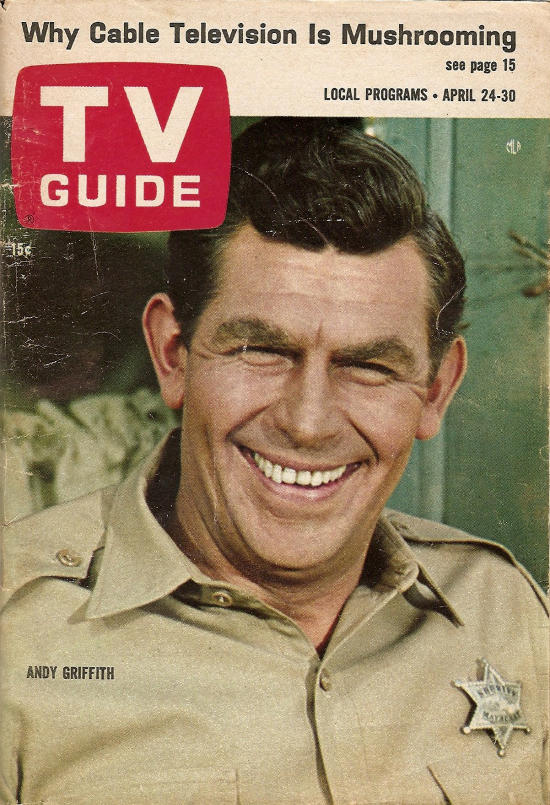
Front Cover – Copyright 1965 Triangle Publications, Inc.
When Dern met up with Griffith again, however, he was all smiles and filled with Mayberry charm. Dern wrote out his folksy speech (“Sorry about the other time. Had a turrible bad cold that day”) just as Leslie Raddatz had in the November 21st, 1964 issue in an article about Jim Nabors. Griffith explained that Knotts will not be replaced next season (Don Rickles and Bernard Fox were among those considered) and will hopefully return “a time or two” if he is free.
As for why he stuck with the series, it was because he was waiting for a substantial film role to come along. Dern summed up the situation:
The picture seemed to be this: Andy wanted to get out of TV, all right, but he wanted out on his own terms. As long as he was lord of The Andy Grifith Show, high in the ratings, he would still be in a position to dictate those terms, if and when that hard -to-come-by “good” movie offer presented itself. Meanwhile, the loot was highly soothing. And it kept a man busy.
“The Networks Ponder Where to Draw the Line” is a disappointing to conclusion to the three-part exploration of adult films on television by Leslie Raddatz. In the first installment he talked to the movie people while in the second he checked in on the government. In this third and final piece he went to the networks. ABC refused to talk to him. CBS vice president for program practices Joseph H. Ream insisted that the network will review movie “on the basis of standards set by the program practices department” just like all other programming.
NBC vice president Robert D. Kasmire revealed that only three films have been rejected since 1961: The Fly, No Way Out, and Lydia Bailey. Viewer standards have changed since then. For example, Ten North Frederick received complaint letters from viewers several years earlier but if aired today probably would not get any. Still, he insisted that NBC was not relaxing its standards. The National Legion of Decency agrees that there has been a “greater maturation and greater sophistication of audiences” over the years and it has altered its ratings for films shown in theaters. Television is another matter. “I think television has a greater responsibility than the motion picture industry,” explained Monsignor Thomas Little, “and advertisers have a great responsibility to the buying public.
Raddatz spoke with a psychologist and a psychiatrist who agreed that violence in the media has an adverse affect on young viewers who may be more aggressive. An anthropologist, however, argued that television may be an important factor in society (and juvenile delinquency) but it is not the “unique cause.” Raddatz considers whether the same holds true for depictions of “casual adulteries and miscellaneous pre- and post-martial sex” that may soon be seen on television. He again notes that some foreign films with adult themes have been shown on television but they are both tasteful works and were tastefully presented.
He concluded the article and his three-part series with the following question:
Whether we are now living, as some would have it, in decadent age, or experiencing, as others believe, a sexual revolution long overdue–whether it takes (heaven forbid) an Act of Congress, or action by the television broadcasters or reaction by the viewing public–does the toilet really belong in the living room?”
David Lachenbruch’s lengthy article about community antenna television (CATV), “He Plants His Antennas In Every Corner of the Nation,” hits many of the same notes the “As We See It” editorial in the November 28th, 1964 issue. CATV started as a way to bring television to viewers who couldn’t receive over-the-air broadcasts but now threatens both local and network broadcasting by bringing local stations from cities across the country into other cities across the country. More worrying, despite denials from the CATV industry, is the specter of pay TV and original programming for CATV systems.
The FCC doesn’t have authority over CATV but it may get it. There are also lawsuits making their way through the courts charging CATV systems with copyright infringement for retransmitting local or network programs without permission. [Today the networks received huge retransmission fees from cable companies.] Some of the networks have decided to play both sides, opposing CATV in public and in court while at the same investing in CATV systems. Nevertheless, CATV continues to grow. One estimate suggests 85% of TV households in the country may one day be wired. A study by the FCC, on the other hand, capped CATV penetration at perhaps 10% of households.
The fourth and final article in this issue is a profile of Don Ameche titled “He Has Moved Out of the Center Ring” by Robert Higgins, which traces Ameche’s career from his first films in the mid-1930s to his attempts to transition to television in the 1950s and finally his most recent gig as host of NBC’s cancelled International Showtime. Although he says he is happy with International Showtime, others aren’t so sure. An anonymous friend said “I can’t watch Don on that show. The smiles and gingersnap he puts into it all is sad. Somewhere, there’s a part of Don that’s died a little.”
Whatever the case, Ameche seems content: “As you grow older, you realize how important it is to do things well. I may never do anything significant, but I’m awe-struck by those who have. I still have energy and an active mind. Now that I’ve discovered what’s important to me, I intend to find out all that I can.”
The “As We See It” editorial this week laments the growth of “teen-age wriggle ‘n’ writhe” shows, seven of which can be seen by viewers in Los Angeles each week: The Lloyd Thaxton Show, Shebang, 9th Street West, Hullabaloo, Hollywood a Go Go, Shiveree, and Shindig. Most of them “offer long-haired boys and sloppily groomed girls making enthusiastic but inept efforts to perform the scores of variations that have been concocted from Chubby Check’s basic Twist.” TV Guide concedes that there may not be anything wrong with wriggle ‘n’ writhe but nevertheless disapproves of how such shows are “turning dancing, which used to be graceful and romantic and fun, into a very questionable spectator sport.”
Cleveland Amory’s review of Gilligan’s Island is relatively positive, which may have surprised many readers of TV Guide. It may be slapstick but there are bright spots, too:
All in all, if you don’t expect too much you can have a good time with this show–although it helps to watch it all in the spirit of a recent plot in which, as we recall, the skipper received a blow on the head which caused him to lose his mind. You had to be pretty alert to notice the difference.
News from the Hollywood and New York TV Teletype columns:
- CBS plans to air all three parts of the Triple Crown: the Kentucky Derby on May 1st, the Preakness on May 15th, and the Belmont Stakes on June 5th. Jack Drees will announce all three races.
- ABC’s Discovery will originate from a different world capital each week during the 1965-1966 season.
- Rex Harrison and wife Rachel Roberts will tour Paris for ABC next season, similar to Sophia Loren’s tour of Rome or Inger Stevens and her tour of Sweden.
- Peyton Place now has 21 regulars. John Newland has been signed as the third director for the show now that it is adding a third weekly episode.
- Alan Young may star in a series called Mr. Phipps Goes West about a Boston teacher if Mister Ed is not renewed for the 1965-1966 season. [It was.]
- Gary Conway will not return to Amos Burke, Secret Agent (formerly Burke’s Law) next season.
- The Adventures of Ozzie and Harriet has been renewed for a 14th season.
- The Addams Family co-stars Jackie Coogan and Ted Cassidy will hit the country fair circuit this summer.
- Frank Sintra will guest star on the premiere episode of NBC’s The Dean Martin Show in September.
Rounding out the national section is a two-page picture feature highlighting the fire engine owned by June Lockhart and her husband, a three-page special feature highlighting some of the outfits worn by Barbra Streisand in her April 28th CBS special, and the regular TV crossword puzzle.
There were three news reports in the “For the Record” column in the listings section this week:
- Four-year-old Victoria Meyerink of The Danny Kaye Show was replaced by another four-year-old, Sofia Mary Gruskin, after she suddenly clammed up and stopped responding to Kaye. Unfortunately, after just three appearances, Gruskin also stopped being as talkative as she once was.
- NBC is planning an examination of Congressional efficiency that may lead to a documentary to air in November. Efficiency firm Arthur D. Little, Inc. of Cambridge, MA will carry out the study, to be called “Study of Congress.” [The resulting documentary was called “Congress Needs Help” and aired on Wednesday, November 24th. David Brinkley narrated.]
- The Early Bird satellite is not quite ready for commercial use. All programs transmitted to date were “freebies,” part of trial period. The FCC and Comsat, the corporation behind Early Bird, work on rates. Also, European nations are more interested in telephone and telegraph transmission than television. A tentative agreement will allow TV to use the satellite after 2PM ET when peak transatlantic telephone hours in Europe have ended.
The letters page this week included four letters responding to the first part of Leslie Raddatz’s investigation of adult movies on television, published in the April 10th issue:
In regard to “Smut in the Living Room?” by Leslie Raddatz, I’m not saying the present-day films should be censored–simply abolished! (With the exception of Disney’s decent, wonderful films.)
Mrs. Thomas A. Kepner
New Castle, Ind.Soon parents of teen-agers will not only have to worry about whether their children can legally be admitted to see movies which they consider obscene. They will have to stay home every day and evening to make sure the children don’t admit the movies into their homes.
P. Saiken
New York, N.Y.It distresses me that there are still so many Freudian cases who can’t view sex without thinking smut. I suggest they exercise their own freedom of choice by changing the channel and stop trying to dictate the entertainment of America’s healthy segment.
Elizabeth Bennett
Lewistown, Pa.I’d like to ask you if “Smut in the Living Room?” is an official view of TV GUIDE or merely an article designed to promote “discussion and thought” among your readers? If TV GUIDE takes the stand with the article, then it is really unfortunate that all objectivity has been tossed to the winds where your journalism is concerned.
Lee Smith
Phoenix
An editorial note explained that TV Guide only takes an editorial stand in its editorials.
There was also a letter praising Julie Harris (“She is an actress with a beautiful soul which shows in her performances.”) as well as two letters responding to ABC’s documentary “The General” (Sunday, April 4th) about Douglas MacArthur. One was positive (“David Wolper’s superb presentation of General MacArthur’s life had unparalleled beauty and grandeur.”) and the other negative (“…the biography of General MacArthur was a disgrace to the memory of a great American.”).
The TV Listings
Sports and specials filled the week, although there weren’t all that many of either. ABC aired Major League Baseball at 2PM on Saturday, April 24th; viewers watching in Eastern New England watched the St. Louis Cardinals face the Cincinnati Reds. Merle Harmon and Jackie Robinson called the game with Howard Cosell conducting interviews. [The game didn’t air on WNHC-TV (Channel 8) in Connecticut; the station aired a different game between the Los Angeles Angels and the New York Yankees.] At 5PM, ABC’s Wide World of Sports included a basketball game between a team from the Soviet Union and the U.S. All-Star squad.
On Sunday, April 25th, CBS pre-empted Lamp unto My Feet and Look Up and Live from 10-11AM to air a documentary called “The Church of the Seven Councils” about the Eastern Orthodox Church. That afternoon at 1PM, the network aired a Stanley Cup Play-off game followed by a baseball game (Boston Red Sox vs. Baltimore Orioles) at 2PM. At 5PM, ABC aired the final half-hour episode of Science All-Stars featuring highlights from earlier episodes. CBS Reports was pre-empted from 10-11PM on Monday, April 26th for “1945,” a CBS News special exploring the impact of events leading up to the end of World War II on the world, with an emphasis on East-West relations. Perry Wolff write and produced the documentary. Eric Sevareid narrated.
NBC celebrated the 25th anniversary of The Bell Telephone Hour on Tuesday, April 27th at 10PM with a special episode featuring five “great moments” from earlier episodes. Featured were Harry Belafonte, Maurice Chevalier, Robert Preston, Maria Tallchief and Rudolf Nureyev, and Joan Sutherland. CBS aired “My Name Is Barbra,” Barbara Streisand’s first television special, from 9-10PM on Wednesday, April 28th. The one-woman show was split into three segments and would go on to win several Emmy Awards.
Gordon and Sheila MacRae hosted ABC’s “The World’s Fair Entertainment Spectacular” on Thursday, April 29th at 10PM. The special featured a tour of the New York World’s Fair with guests Al Hirt and the New Christy Minstrels. Gil Cates produced and directed.
Here are the TV Guide close-ups for the week:
- Saturday Night at the Movies – Annie Get Your Gun (NBC, Saturday at 9:00PM)
- CBS News Special – “1945” (CBS, Monday at 10:00PM)
- The Bell Telephone Hour (NBC, Tuesday at 10:00PM)
- Special: My Name Is Barbra (CBS, Wednesday at 9:00PM)
- Special: World’s Fair Entertainment Spectacular (ABC, Thursday at 10:00PM)
- Rawhide – “The Calf Women” (CBS, Friday at 7:30PM)
- Bob Hope/Chrysler Theatre – “A Time for Killing” (NBC, Friday at 8:30PM)
- FDR – “The Dark Days” (ABC, Friday at 9:30PM)
Locally, there was a lot of baseball this week. There was the WNHC-TV Los Angeles Angels-New York Yankees game on Saturday, April 24th at 1:55PM as well as a Boston Red Sox-Baltimore Orioles game on WHDH-TV (Channel 5) at 2:15PM that same day. WNHC-TV aired another game between the Angels and the Yankees on Sunday, April 25th at 12:55PM. On Tuesday, April 27th at 9PM WHDH-TV aired a game between the Red Sox and the White Sox. And on Friday, April 29th WNHC-TV aired a game between the New York Mets and the Cincinnati Reds at 9PM.
At 8:30PM on Saturday, April 24th educational station WGBH-TV (Channel 2) aired a lengthy World Forum titled “The Free Society and its Posture in World Affairs, 1965” moderated by Walter Cronkite. The two-and-a-half hour broadcast was the keynote of the dedication of the Prudential Center in Boston. Trinity College in Hartford, CT was featured on WNHC-TV’s Morning Seminar on Sunday, April 25th from 11-11:30AM. WTEV (Channel 6) broadcast the fifth and final game of the 1965 NBA Finals between the Boston Celtics and Philadelphia 76ers at 2PM. TV Guide published a notice explaining that the game would only be telecast if it was needed. In light of this uncertainty, the listing for WTEV at 2PM was “To Be Announced.”
WPRO-TV (Channel 12) aired “Salk vs. Polio: Victor Over Disease” at 6:30PM on Sunday, an installment of David L. Wolper’s syndicated documentary series Men in Crisis. Here’s an advertisement:
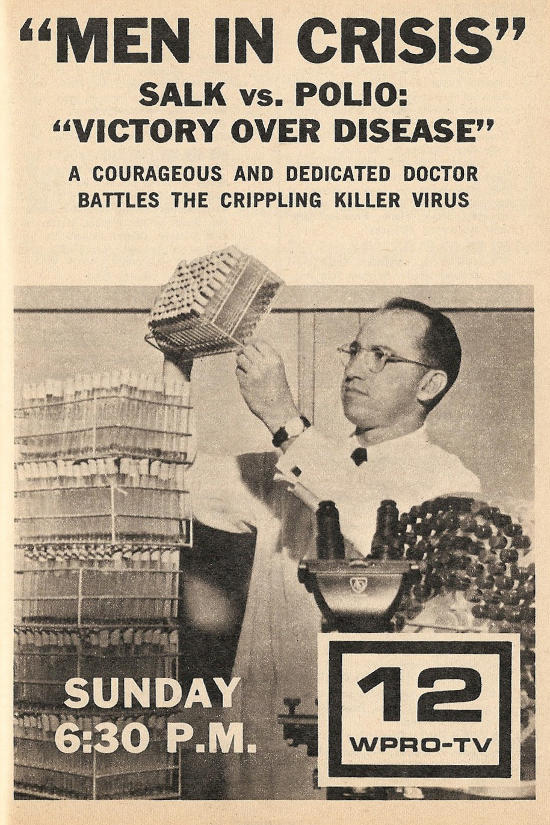
Advertisement for Men in Crisis: Salk vs. Polio on WPRO-TV (Channel 12) – Copyright 1965 Triangle Publications, Inc.
On Monday, April 26th at 9PM, WNAC-TV (Channel 7) pre-empted ABC’s Wendy and Me and The Bing Crosby Show to air a documentary called “My Two Childhoods” comparing the childhoods of Hubert H. Humphrey and author James Baldwin. WGBH-TV aired another college lacrosse match between Worcester Polytechnic Institute and MIT on Thursday, April 29th at 7:30PM. And on Friday, April 30th at 8:30PM, WGBH-TV aired a 75-minute United Nations Day concert taped on October 24th, 1964.
Here’s an advertisement for WHDH-TV’s weekday New England Farm and Food Program, hosted by Joe Kelly:
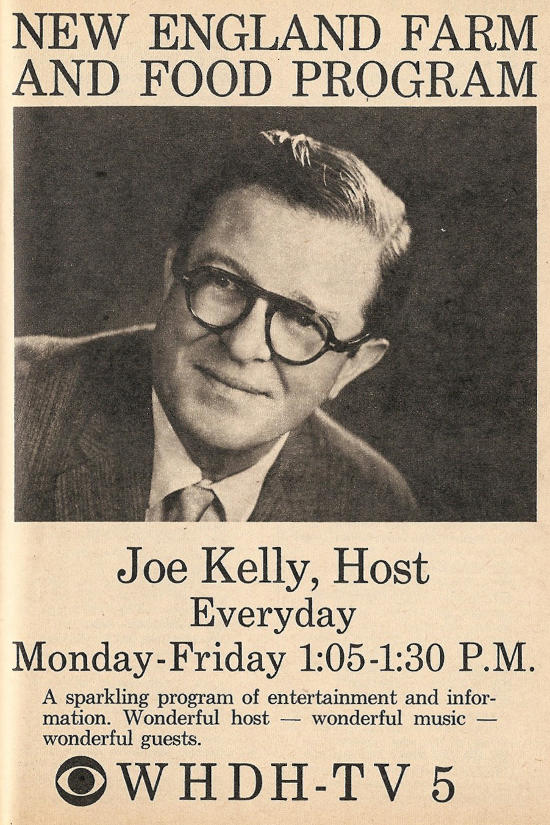
Advertisement for WHDH-TV’s New England Farm and Food Program – Copyright 1965 Triangle Publications, Inc.
And here’s an advertisement ABC’s Nightlife on WTEV (Channel 6) with an outdated ABC eagle logo:
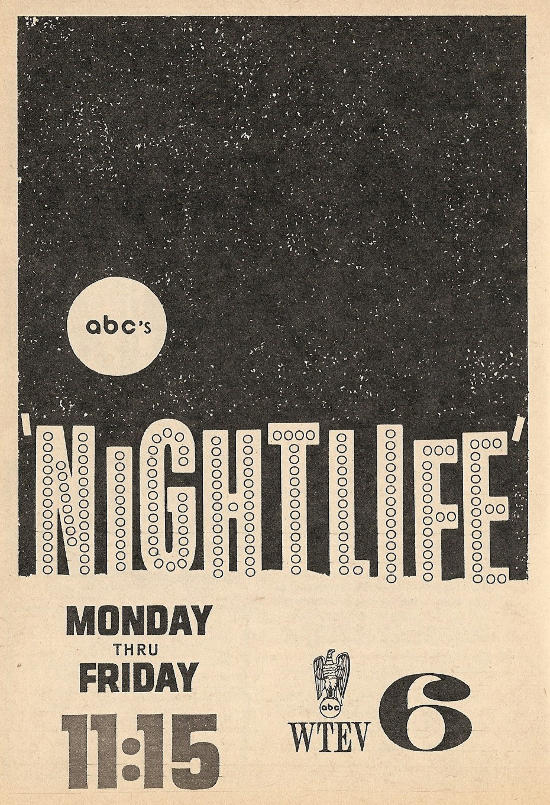
Advertisement for ABC’s Nightlife on WTEV (Channel 6) – Copyright 1965 Triangle Publications, Inc.
Here are the episode descriptions for Dateline Boston, a local series broadcast live and in color Monday through Friday from 6-6:25PM on WHDH-TV (Channel 5):
Monday, April 26th, 1965
Capt. Bob illustrates line and perspective.Tuesday, April 27th, 1965
The resources and enjoyment of a public library are shown.Wednesday, April 28th, 1965
The “Frontiers of Space” are explored.Thursday, April 29th, 1965
[No description.]Friday, April 30th, 1965
This special program marks the second observance of Law Day around the world.
That’s it for this week. Hit the comments with your thoughts.


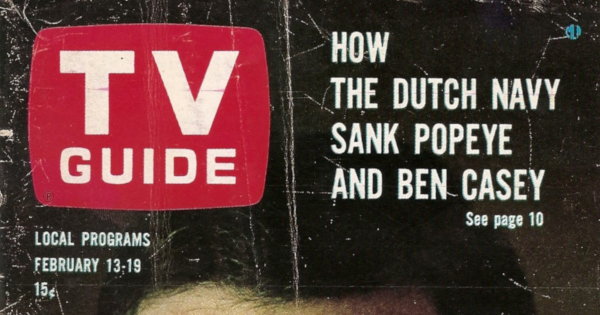
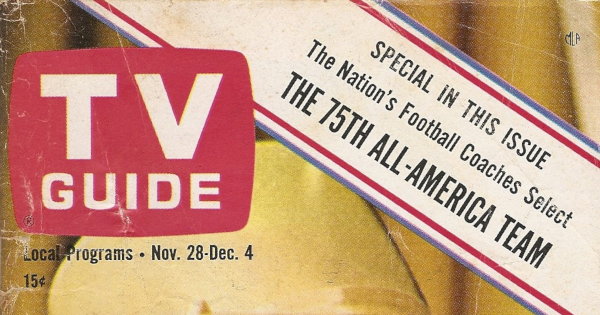
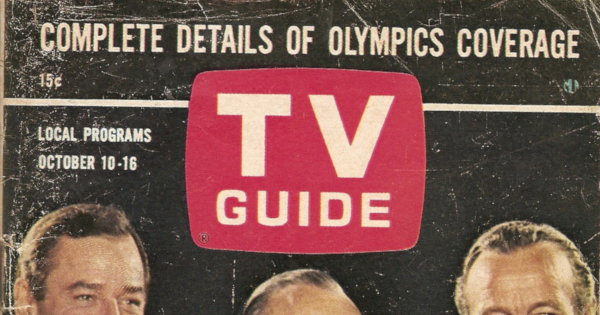



More typos! You mentioned CBS broadcasting a Stanley Cup playoff game at 1 PM (twice!), and over-using the word ‘the’ twice in the Leslie Radditz probe on adult movies. Slow down or drink a little less java, okay?
And thanks for noticing the outdated ABC eagle logo used in WTEV (now WLNE)’s advertisements. I at first thought it represented E. Anthony and Sons, publisher of the New Bedford Standard-Tmes newspaper, which owned 55% of the channel at that time. But now i see the light. I mentioned some time ago that ABC used an eagle logo from 1953-57, switching to a giant lower-case letter A which begat the famous circle logo we know and love, circa 1962.
I will search YouTube for the “Men In Crisis” segment about Jonas Salk. It seems to be a fascinating find and i’d like very much to see it.
BTW, i found a GOLD MINE! I’ve tapped into a very rich vein of old TV Guide listings from the past, lovingly looking into several editions from all around the US. It’s called CTVA: The Classic TV Archive. Look it up sometime in the not-too distant future. I’ll bet you gonna be delirious at what you find!
If you’d like to see a portion of what i’ve found, here’s a little taste: http://ctva.biz/US/TV-Listings/TVG_1965_04_10_Sat_0600_channels.jpg
I have also noticed this: in the Philadelphia edition, only WLYH-TV and WGAL-TV were listed. Turns out WHP-TV and WSBA (now WPMT) were listed in that edition ONLY in ads for CBS shows. Please disregard my earlier thoughts.
The thought of either Bernard Fox or Don Rickles as regulars on “The Andy Griffith Show” is fascinating. Maybe they were considering a very proper deputy who was from England, or a deputy from Brooklyn or the Bronx.
Well i must concur on that, Dave. It sure would have given the show a different kind of tone. Who wouldn’t have liked to have seen Andy paired with a Britonite? Or even the Gunther Toody or Francis Muldoon type from Car 54. As it stands, Don Knotts’ guest appearances kept the folksy flavor the show was always meant to have.
In the article, Andy Griffith stated that it was decided to not replace Don Knotts. Apparently, that decision was reversed after the article was written. I remember Jack Burns as the new deputy, but I did not remember that he was not with the show for very long. I found this information in the Wikipedia entry for Jack Burns: “During the first half of the 1965-1966 season of The Andy Griffith Show, in an attempt to replace the Don Knotts’ Barney Fife character after Knotts left the show, Burns was cast as Warren Ferguson, a dedicated but inept deputy sheriff. His character was not popular, and was dropped after eleven appearances.”
In the first few seasons of the Griffith show, Bernard Fox played a recurring character named Malcolm Merriweather, a befuddled British tourist who passed through Mayberry a few times.
I would guess that the idea her would be Malcolm, a gentle, soft-spoken type, would take the deputy job in a slightly different direction than the semi-manic Don Knotts.
This became academic, however, because by this time Bernard Fox was also recurring on other shows, such as HOGAN’S HEROES (as Col. Crittenden), and BEWITCHED (as Dr. Bombay) – both louder and more forceful characters than Malcolm was.
As to Don Rickles, he was still a few years away from his breakthrough. Danny Thomas and Sheldon Leonard were fans, and were always pitching him for possible series roles, usually to little avail.
Rickles was “not safe for prime-time ” until the late ’60s.
The article on community antenna television (CATV) possibly providing non-local TV broadcasts and original cable programming got me doing a lot of local research.
I live in northwest Pennsylvania, surrounded by mountains, so my local cable provider began in 1953 as Meadville Master Antenna. I wanted to know when the former MMA began transmitting anything other than network broadcast stations and their own local-programming cable channel. What were they providing in 1964?
Unfortunately, I couldn’t find answers to my questions. If it wasn’t completely off-topic I’d write about I did learn — in 1953 they were providing three channels. The cost was $125 to have cable installed in your home, and then $3.50 a month. Those three channels came from three cities — Erie, Pittsburgh, and Cleveland, for that’s how far afield they had to go to find three networks. (NBC was from Erie, one of the cities was surely providing CBS, but the interview I read didn’t specify whether the other network was ABC or Dumont.)
If I ever come across a 1953 CATV article I’ll have to post what I’ve just learned ….
“As to Don Rickles, he was still a few years away from his breakthrough”
Not entirely true. He already had large parts in most of the AIP ‘beach party’ movies. Hard to believe, but they were hug hits. ;)
Never have been quite on board with ‘The Andy Griffith Show’. It’s enjoyable, but find it often a bit TOO folksy.
Don Rickles’s “breakthrough” referred to his somewhat belated emergence as “Mr. Warmth”, the scourge of the nightclub floor.
Before that, Rickles was mainly a character actor, better known within the business than to the mass audience.
A “large part” in an AIP beach movie rarely meant more than getting to pop up and yell “It’s Watusi time!” at a couple of points in the picture; usually, he was jockeying for screen time with up to a dozen or more “teens”, bikini babes, and old comics.
If memory serves, Jack Burns’s character Warren was supposed to be the Boston-born nephew of another Mayberryan (can’t recall which one).
“A “large part” in an AIP beach movie rarely meant more than getting to pop up and yell “It’s Watusi time!” at a couple of points in the picture; usually, he was jockeying for screen time with up to a dozen or more “teens”, bikini babes, and old comics.”
Untrue.
Of course, the focus was on the..uh..”kids”, but he was still a substantial character in 4 of them. In fact, in a club scene in the last, he’s allowed to rip into Avelon in his patented style.
Note: I’m NOT a Rickles fan, but I do love those AIP flicks.
in the 1960s there was a Farm Program hosted by (Bob Walsh sp) around 5:30 or 6:00am? I used to watch it while doing my exercise. He was a great guy coming back from the war. He introduced and gave a good start to a young Weather Forecaster from Air Force (I think) stationed in Fort Worth. My Odometer is sitting on 86 years and my memory needle is not on the high mark. If there are some ol timers or history buffs out there – please send me an email and help me brush off the memories.Thanks.
[email protected]